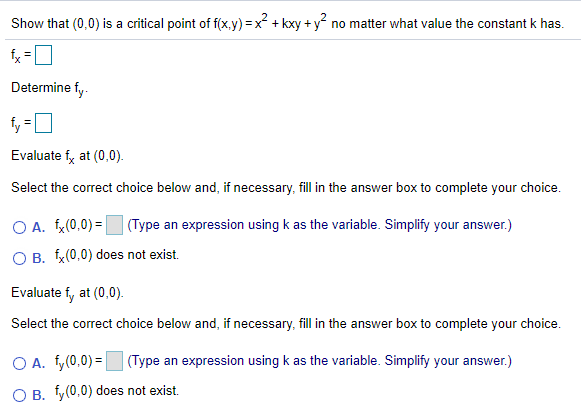Show that (0,0) is a critical point of f(x,y) =x² + kxy + y no matter what value the constant k has. fx =0 Determine fy. fy =O Evaluate fy at (0,0). Select the correct choice below and, if necessary, fill in the answer box to complete your choice. O A. f(0,0) = (Type an expression using k as the variable. Simplify your answer.) O B. fx(0,0) does not exist. Evaluate fy at (0,0). Select the correct choice below and, if necessary, fill in the answer box to complete your choice. O A. f,(0,0) = (Type an expression using k as the variable. Simplify your answer.) O B. fy(0,0) does not exist.
Show that (0,0) is a critical point of f(x,y) =x² + kxy + y no matter what value the constant k has. fx =0 Determine fy. fy =O Evaluate fy at (0,0). Select the correct choice below and, if necessary, fill in the answer box to complete your choice. O A. f(0,0) = (Type an expression using k as the variable. Simplify your answer.) O B. fx(0,0) does not exist. Evaluate fy at (0,0). Select the correct choice below and, if necessary, fill in the answer box to complete your choice. O A. f,(0,0) = (Type an expression using k as the variable. Simplify your answer.) O B. fy(0,0) does not exist.
College Algebra (MindTap Course List)
12th Edition
ISBN:9781305652231
Author:R. David Gustafson, Jeff Hughes
Publisher:R. David Gustafson, Jeff Hughes
Chapter2: Functions And Graphs
Section2.6: Proportion And Variation
Problem 18E
Related questions
Question
a) determine fx and fy
b) evaluate fx at (0,0) and fy at (0,0)
c) answer whether the information is sufficient to show that (0,0) satisfies the definition of a critical point for f(x,y), for every value of the constant k

Transcribed Image Text:Is this information sufficient to show that (0,0) satisfies the definition of a critical point for f(x.y), for every value of the constant k?
O A. No, because at least one of the partial derivatives is not equal to zero at (0,0) for all values of k.
B. No, because both of the partial derivatives are not equal to zero at (0,0) for some values of k.
OC. Yes, because both of the partial derivatives are undefined at (0,0) for all values of k.
O D. Yes, because both partial derivatives are equal to zero at (0,0) for all values of k.

Transcribed Image Text:Show that (0,0) is a critical point of f(x,y) =x + kxy +y no matter what value the constant k has.
Determine fy.
fy =O
Evaluate f, at (0,0).
Select the correct choice below and, if necessary, fill in the answer box to complete your choice.
O A. fx(0,0) =
(Type an expression using k as the variable. Simplify your answer.)
O B. fx(0,0) does not exist.
Evaluate fy at (0,0).
Select the correct choice below and, if necessary, fill in the answer box to complete your choice.
O A. fy(0,0) = (Type an expression using k as the variable. Simplify your answer.)
O B. fy(0,0) does not exist.
Expert Solution
This question has been solved!
Explore an expertly crafted, step-by-step solution for a thorough understanding of key concepts.
Step by step
Solved in 3 steps with 2 images

Recommended textbooks for you

College Algebra (MindTap Course List)
Algebra
ISBN:
9781305652231
Author:
R. David Gustafson, Jeff Hughes
Publisher:
Cengage Learning

College Algebra (MindTap Course List)
Algebra
ISBN:
9781305652231
Author:
R. David Gustafson, Jeff Hughes
Publisher:
Cengage Learning